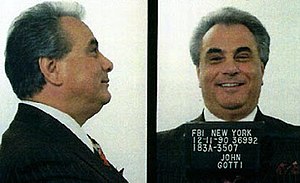Rizzuto gets Catholic funeral, but church has in past denied mobsters' funerals

It's been a dicey dilemma for Catholic leaders in the past: to agree, or not to agree, to provide a church funeral for a well-known gangster?

Nicolo Rizzuto, a reputed Mafia don, was given a Roman Catholic funeral Monday in Montreal.
But the church has occasionally refused such rites to Rizzuto's counterparts in the past under a set of guidelines that provide it with considerable interpretive leeway.
One Catholicism expert says that under the church's Code of Canon Law, Mafia dons could be denied a funeral ceremony.
The church's code of conduct states that "manifest sinners" cannot be given a funeral mass if it would result in public scandal of the faithful.
"One would think that that may raise a question mark," McGill University's Daniel Cere said Monday, pointing to the world of organized crime.
In the past, church officials have decided against holding Catholic funerals for other mob leaders, including John Gotti and Paul Castellano.
Both Gotti, who died in 2002, and Castellano, killed in 1985, were former heads of the notorious Gambino crime family. Gotti ordered Castellano killed and was linked to other murders.
Rizzuto, on the other hand, was convicted of several crimes, including gangsterism, and his clan is suspected of killing many rivals over the years.
But he was never convicted of murder.
Cere said the church tends to have a loose interpretation of the funeral guidelines unless the deceased has formally repudiated the Catholic faith.
"My impression is that the church . . . has been reluctant to get into debates," the religious studies professor said.
"It would probably be a bit messy if they started to try to provide tighter criteria in terms of denial of funerals, so I think they tend to take a fairly relaxed attitude towards the issue."
When the decision whether to permit or disallow a funeral ceremony is up for debate, Cere says the local bishop has the final call.
Under canon law, there are three categories for refusing to provide a Catholic funeral. Someone could be denied a funeral unless they gave, before dying, some sign of repentance for the following:
-Being notorious apostates, heretics and schismatics.
-Choosing the cremation of their bodies for reasons contrary to Christian faith.
- Being manifest sinners who could not be granted ecclesiastical funerals without public scandal of the faithful.
"It looks like there's a lot of leeway in all of these," said Cere. He added that canon law is a collection of guiding principles, not absolute rules.
The issue over who should or shouldn't be granted a Catholic funeral generated much discussion in Iowa in 2008 after six members of the same family died in an apparent murder-suicide.
Steven Sueppel, believed to have beaten his wife and four children to death before killing himself, was given a joint funeral with his family.
The Sueppels' relatives decided to forgive him and honour the deceased together.
But many people thought that Sueppel should not have been granted a Catholic funeral.
http://www.medicinehatnews.com/2010111517213/national-news/rizzuto-gets-catholic-funeral-but-church-has-in-past-denied-mobsters-funerals.html


0 comments:
Post a Comment